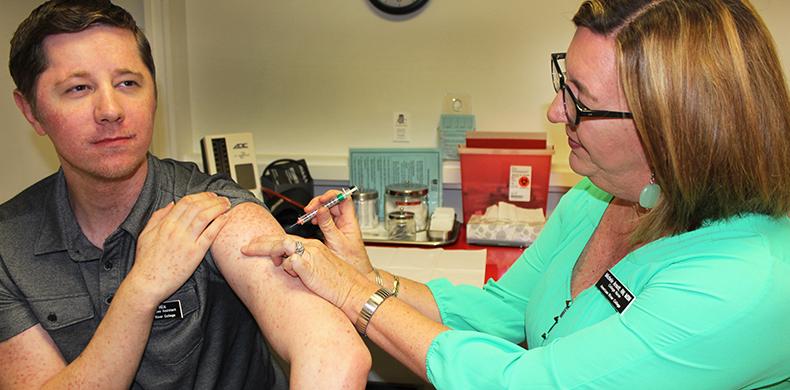Brandon Nelson: YES
Considering that the CDC reported the United States as a whole eradicated measles in 2000, the outbreak of measles that was sourced to Disneyland in California in mid-December of last year has made one thing clear to the population of not only the state but the country as a whole – get vaccinated.
Colleges can be a cesspool and breeding ground of disease due to the close contact of students.
Some colleges have become proactive in overcoming this disadvantage, as Chico State is now requiring students to provide proof of immunizations against measles and hepatitis B in order to attend classes there.
Unfortunately its not enough because some students can get a waiver to not get vaccines because of religious reasons.
ARC should be the school to bcommunityreak this trend, by creating a zero tolerance policy regarding vaccines we can protect the community at large as well as our students and all the children in the day care center on campus.
According to vaccines.gov, a federal government website managed by the U.S. Department of Health and Human Services, young adults from the age of 19-24 are encouraged to receive vaccinations against several diseases that spread quickly among community and university college campuses nationwide, including meningitis, HPV, and the flu.
College campuses, including American River College, are breeding grounds for pathogens and diseases that show their deadly effectiveness when exposed to a large, interacting populace.
Outside of religious reasons, one of the main reasons people feel opposed to vaccinations stems from what has been dubbed the “anti-vaccination” movement, which has almost been entirely founded on misleading and, at absolute worst, outright false information.
One of the roots of this stems from research conducted by Dr. Andrew Wakefield in February of 1998, which found that eight out of 12 children who received an MMR vaccine at a hospital were found to develop mental impairment following the vaccinations as well as a new inflammatory bowel disease that exasperated the symptoms.
Further investigation by The Sunday Times and the General Medical Council revealed that the children’s described ailments during the study were different from the records that were maintained by the hospital.
Hospital pathologists were also found to have reported in the majority of cases that the internal organs of the children were normal, whereas the initial report suggests a prevalence of bowel disease that followed the vaccinations.
Participating in the day-to-day activities of society constitutes a social contract, which also includes an obligation to ensure that diseases that could potentially cripple modern society remain out of the herd.
Even if no hard-hitting, direct research has been done that has universally connected vaccines with things like autism or other complications, the United States, Italy, and several other countries across the world have programs in place to provide financial compensation to the families of those who claim to be negatively affected by vaccines.
Even if there are potential side effects that can damage a small minority of the population at large, there are avenues in place to help these individuals.
A larger portion of the U.S. population remains at risk if an anti-vaccination stance is seriously entertained.
According to the CDC, 8961 preventable deaths occurred as a result of vaccines not properly administered from June 2007 to February 2015, with 146,046 preventable illnesses reported as well.
Results from vaccinating literally speak for themselves – according to the National Institute of Allergy and Infectious Diseases, polio and smallpox have been completely wiped off the planet thanks to vaccinations, while other diseases like mumps and rubella have been reduced drastically.
The effectiveness of vaccinations at preventing contraction and spread of disease is unquestionable with the plethora of medical data currently available, and direct links that correlate vaccines to conditions like autism are not solidified.
Vaccines are essential to the health of our society, and the real place to start the pro-vaccination discussion is in the doctor’s office.
Luckily, some places like in Southern California are doing just that.
According to CNN, doctor Eric Ball, who runs a clinic in southern California, keeps patients who may be carrying disease out of the office, and will treat them in their family car or offer medical dissertation via email.
By doing this, Ball ensures his parents who are not yet of age to receive the vaccinations are kept safe and away from those too irresponsible or paranoid to get vaccinated.
With every passing second, those who affiliate with the anti-vaccination crowd continue to put fellow citizens at risk with their reliance on shaky, untrustworthy, and outright laughable resources.
We have the scientific data to prove the effectiveness of vaccines, and while more data needs to be compiled to determine the potential harm that may befall a small sliver of vaccine recipients, it is irresponsible to neglect vaccines altogether.
Those who caught the measles from Disneyland would likely agree as well.
Cameron Weaver: NO
With vaccination hype having resurged since a measles outbreak at Disneyland in December of last year, there is a bigger push for inoculations from supporters inside and outside the media than any time in recent memory.
The debate against the benefits of vaccinations versus the potential harm they may cause has been debated fervently, but another key aspect seems to have gone unchecked.
As a country that champions individual choice, the United States should keep hold on that promise and not force vaccinations on any citizens that choose to opt out, regardless if its in the workplace or the classroom.
Forcing vaccinations, akin to legislation currently being discussed in the state legislature that seeks to open the possibility of mandatory vaccinations becoming a reality in public schools, is ineffective for vaccine proponents in support of their message.
Various points in U.S. history have shown how ineffective mandatory vaccines have been.
Less than 10 percent of schoolchildren were vaccinated in Chicago in 1893, despite the fact that they had a state law in place for the previous twelve years that prohibited child enrollment in public schools “without satisfactory evidence of a proper and successful vaccination.”
The subsequent apathy shown by parents in observing these vaccine laws was blamed as the catalyst for continual smallpox outbreaks that occurred in the area.
Resistance from the general public in embracing a national vaccination mandate persisted throughout the 1900s, prompting a nationwide Childhood Immunization Initiative to be enacted in 1977 with the goal of aggressively increasing childhood vaccination levels to 90 percent by 1979.
This hands-on approach by the Department of Health, Education, and Welfare was the first massive mobilization by the federal government in pushing vaccinations since the country’s founding, and has reshaped the vaccine argument in the decades to follow.
There’s a message to be pulled from this history lesson – United States citizens do not appreciate being forced to comply with the wishes and desires of their government when it comes to decisions regarding their health, and it wasn’t until the federal government pushed its involvement ten-fold that vaccines started to gain national compliance.
Rejection of required vaccinations on religious grounds is currently allowed in all but two states: Mississippi and West Virginia. The rate of people claiming religious exemption has steadily increased in the last two decades.
In Massachusetts, religious exemptions from vaccination requirements rose from 0.24% in 1996 to 0.60% in 2006.
Does affording parents and children the chance to decide for themselves what route to pursue on the vaccination trail open up a possible scenario for massive death and destruction of “the herd?”
Absolutely not, and the religious exemption rates in Massachusetts paint a broad picture that many United States citizens have known in centuries past – allowing the option to decline vaccinations will not impact health on a national level to the point of crisis.
Proponents of previous outbreaks can argue the massive death toll and economic burden of vaccine-treatable disease may be prevented through mass vaccination, but medical advances in the last century has rendered many of these worries and fears inert.
Access to facilities, medicines, and treatments for afflictions has never been stronger in our nation’s history, and diseases that were once death sentences are now treatable and sufferers find themselves not only a second chance at life, but developed immunity to these diseases that can be passed down to their children.
Instead of resting on fear arguments and juggling potential health implications to push vaccinations, proponents of mandatory vaccination need only to look at the past to see how successful mandates on the topic have been previously.
When left to their own devices, United States citizens prefer to have the choice, rather than a requirement.
When a debate is still persisting into 2015 about the potential negative health effects associated with vaccine inoculation, it is worth addressing these concerns with more thorough and conclusive data before attempting to sell the population on vaccines being beneficial enough to relate potential side effects as merely causative without correlation.
That is simply not compelling enough evidence to encourage someone to potentially put their children in harm’s way.
As Massachusetts’s religious exemption figures show, there is no sudden push for a massive portion of the population to outright deny vaccinating themselves or their children.
For reasons religious and otherwise, a minority of people are still on the fence about vaccines being truly safe and beneficial for all, and the burden of proof to assert that safety beyond a shadow of doubt lies on the CDC and its associated partners.
Until that day comes, leaving vaccinations as a choice honors not only the American spirit of self-determination, but also pays homage to the opponents of vaccination that have graced the conversation in decades and centuries past.
Frankly, if vaccines were the one-shot solution to the world’s health ills, we wouldn’t still be debating the topic so fervently, and that is what will need to be addressed before the conversation can move forward, one booster shot at a time.














